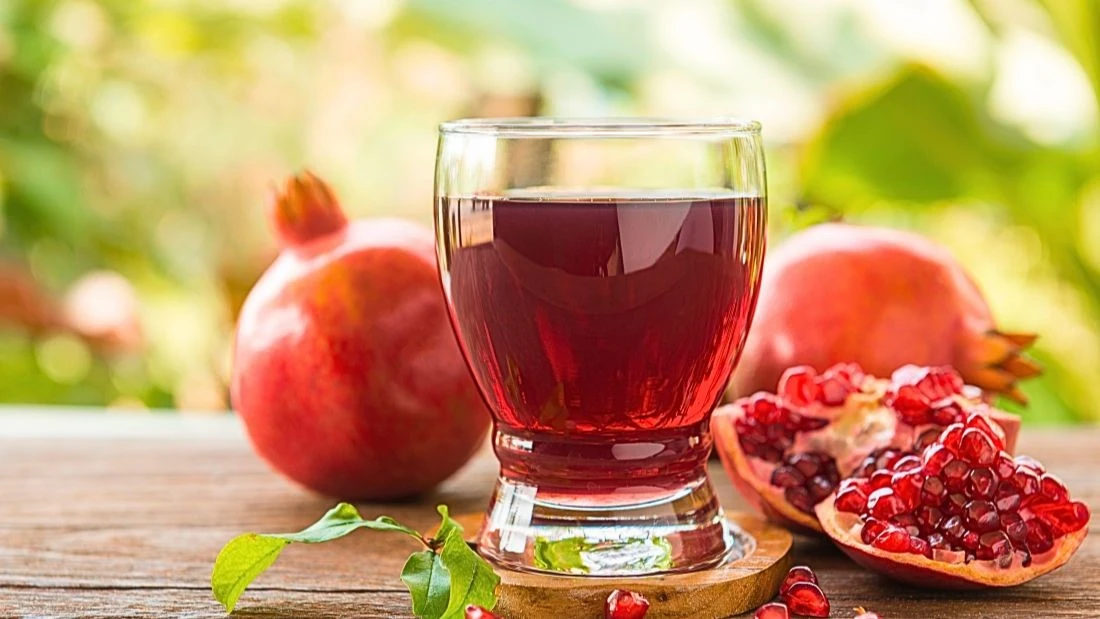Pomegranate

Unmistakable in both its appearance and taste, the pomegranate is a nutritional treasure trove.
If you’ve ever been to the Mediterranean, chances are you came across pomegranate trees – or shrubs to be precise – every now and then. They are native to the Middle East but have been cultivated in South Asia, North Africa and the Mediterranean for millennia.
The anatomy of a pomegranate
Each pomegranate fruit has a hard outer rind, a spongy underlayer that holds and cushions the seeds, and membranes that divide the inside of the fruit into asymmetrical chambers. That means there is no universal rule for how to ‘open’ a pomegranate because each fruit has its inner membranes organised differently. A typical fruit has over 200 seeds but it can be over 1,000!
Every pomegranate seed is surrounded by fleshy, juicy pulp that contains powerful antioxidants and health-protective compounds. Some are also responsible for the bright red colour of the seeds and may permanently stain your clothing. The seeds are either eaten whole or juiced while the outer layers – the rind and the white spongy layer – are too bitter to be palatable.
Pomegranate nutrition
One cup of pomegranate seeds (120 grams) can really boost your health. It provides 25 per cent of your daily vitamin K requirement, 21 per cent of vitamin C and 12 per cent of folate. These vitamins are crucial for your immune system, healthy blood clotting, wound healing, joint and bone health, nerve and brain function, cell reproduction and more. Pomegranate seeds also contain small amounts of important minerals, such as zinc, copper, magnesium and potassium.
The pomegranate is certainly a healthy food but because it contains larger amounts of vitamin K, it can interfere with some blood-thinning medications. If you’re taking warfarin or similar medication, have a word with your doctor before feasting on pomegranates or their juice.
Health protector
The main health benefits of pomegranates stem from their powerful, natural antioxidants and polyphenol compounds. They help to protect your cell membranes and DNA from damage and are anti-inflammatory. These compounds are also antimicrobial – when you have an infection, they help you to defeat it. Pomegranates and their juice can help you get rid of some common bacterial and yeast infections – including Candida.
The anti-inflammatory effect of pomegranates is so strong that researchers are looking into how to use them to treat chronic inflammatory conditions such as heart disease, type 2 diabetes, Alzheimer’s disease, arthritis and even cancer. In one study, drinking a glass of pomegranate juice daily helped to lower the participants’ blood pressure in just two weeks. Of course, a vegan diet is excellent for blood pressure lowering but if yours is too high, pomegranates may help!
On the other hand, if you have low blood pressure, be careful. Pomegranates, if consumed on a regular basis, can increase the risk of your blood pressure dropping too low.
Many studies have investigated the anti-cancer properties of pomegranates and their extract has been used to stop the growth of some cancer cells in laboratory studies. It has been effective in interfering with prostate, breast, mouth, lung and colon cancers.
In some human studies, just one daily glass of pomegranate juice showed remarkably positive effects.
Stamina booster
Just like beetroot, pomegranates are rich in natural nitrates which help your blood vessels to dilate, allowing more blood to flow into your muscles. When you’re exercising, your muscles are using oxygen faster than usual, so when your blood vessels allow more oxygen-rich blood into them, it delays the onset of fatigue. In other words, you won’t start feeling tired so soon and will be able to do more.
Try drinking a glass of pomegranate or beetroot juice 30 minutes before your workout to test the effects!
Pomegranate’s anti-inflammatory effects can also help in athletic recovery – protecting your muscles from excess damage during training and speeding up the repair afterward.
Juice or seeds?
The studies mentioned mostly used pomegranate juice or extract to measure the participants’ intakes accurately. Drinking juice is undoubtedly easier than extracting pomegranate seeds but the latter is worth the effort. The seeds offer a lot of beneficial fibre that helps to keep your digestive system healthy and provide the maximum amount of all the nutrients in the fruit, some of which are reduced in juice.
If you do prefer to drink your pomegranate, always check that you’re buying quality juice and not a diluted drink with added colourants.
How to choose a pomegranate?
When you’re selecting your perfect pomegranate, look for one with a rich, dark red colour, glossy skin and heavy feel – when ripe, it should feel heavy for its size. The shape of the fruit can also indicate ripeness and maximum juiciness – a nice sphere with some visible edges.
Keep pomegranates in the fridge, or at least out of direct sunlight. If you don’t eat the whole fruit in one sitting, you can keep the rest of it in the fridge for up to five days or freeze the seeds for later.
Making less of a mess
Everyone has their best way of opening a pomegranate by scoring and cutting in different ways – but there isn’t a right or wrong way. Some people cut the fruit in half and then tap each half with a heavy spoon to knock the seeds out. Others cut the fruit in half and then pick them out by hand. You can make things easier for yourself by separating the seeds from the white membranes in a bowl of water. The seeds sink while the membranes float and the water minimises the seeds spraying you with juice! Another trick is to freeze the pomegranate to make the process less messy.
Whichever way you decide to eat pomegranates, they have a lot to offer. They haven’t been a part of many traditional diets just because they’re pretty and delicious, some of their health effects have been known for centuries. Enjoy their ruby-red deliciousness!




